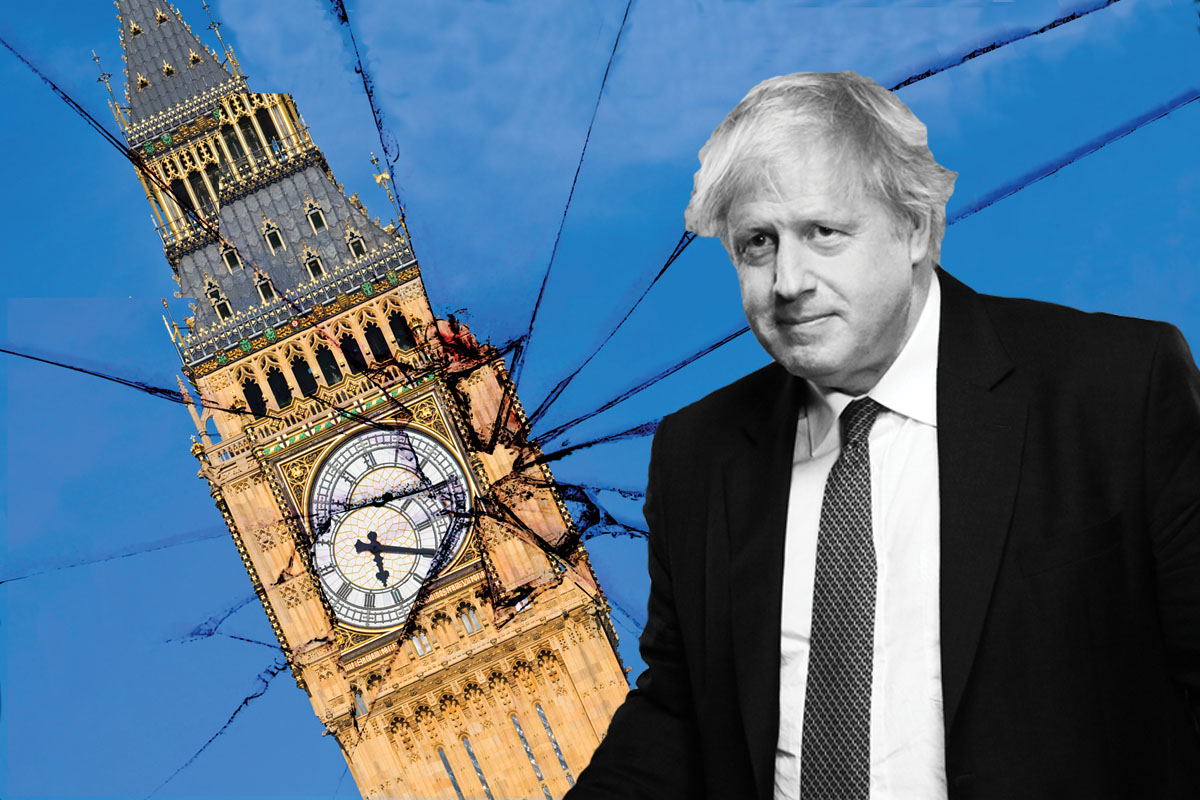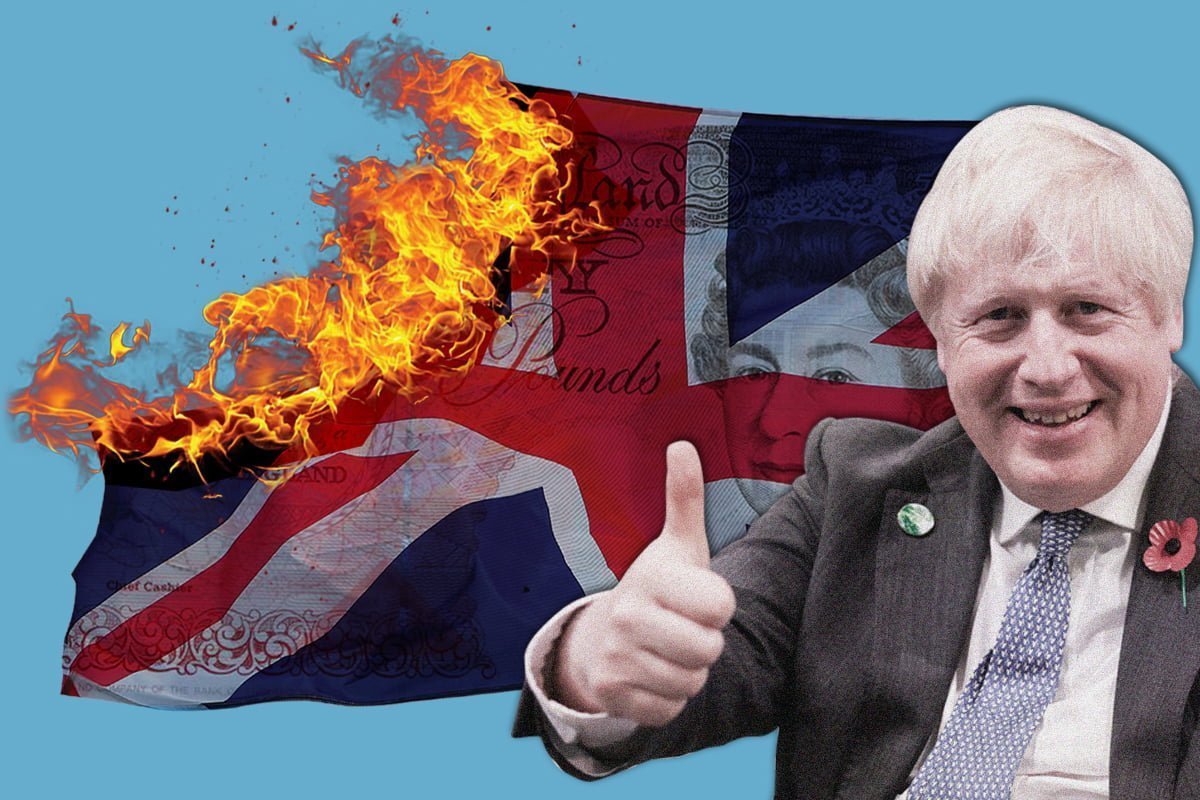From trade wars, to economic chaos, to cronyism and corruption: Boris Johnson’s criminal government is fighting a losing battle on multiple fronts. These are all symptoms of a regime in crisis – and of a system that has reached a dead-end.
With Boris Johnson and his government of imbeciles going from bad to worse, many must be praying for the return of Guy Fawkes to finish where he left off.
Problems are rapidly piling up. Within a week, as the contradictions over Brexit emerged, the Tories threatened a trade war with France about fish, and another with the European Union over the Northern Ireland protocol.
At the same time, Downing Street had to carry out a humiliating U-turn regarding their support for Owen Paterson, a former Cabinet minister, who was caught lobbying for huge financial gain.
Eventually Paterson was forced to resign, and the government was left with egg on its face. But this is no storm in a teacup. It underlines the fact that there is one rule for the rich, and another for the rest of us.
The whole episode reveals the corruption at the heart of government, and how adept the Tories are at pouring petrol onto the flames of public discontent.
Trade wars

The threat by the British government to suspend the Northern Ireland protocol by triggering Article 16 has been met with a counter-threat from the EU: that Brussels could suspend the entire trade deal struck last December. “One is contingent on the other,” stated Simon Coveney, Ireland’s foreign minister.
The protocol allows the North of Ireland to remain in the Single Market while EU checks are carried out on goods entering from Britain. Breakdown of this arrangement could result in an all-out trade war. It would mean Dublin imposing custom checks at the border with the North.
Recent British threats against the French over fishing rights, meanwhile, have all the bluster of a market stall holder.
The provocation from Jersey’s government – a glorified local council – in refusing to grant licenses to French fishermen under the Brexit agreement has led to a war of words. ‘We will teach these Frenchies’, is the British attitude, epitomised by Liz Truss, the foreign secretary.
Of course, the French have reacted with their own threats: to prevent British boats from landing their catch in French ports; to blockade Jersey; and to cut off electricity supplies to the UK.
The Tory government’s response was to put the Royal Navy on alert to protect our turbot, halibut, and whelks.
In the end, sabre-rattling was replaced with talks. But the situation could turn sour very quickly, as both sides become entrenched. This row has poisoned relations to Britain’s disadvantage.
“It’s a case of total collapse of confidence,” stated Lord Ricketts, a former UK ambassador to France, “after so many cases where the British government hasn’t respected its word.”
Stench and sleaze

These episodes are changing the political landscape in Britain. The reputation of the government, even amongst Tories, has gone over a cliff. Johnson’s personal rating has dropped to minus 20, surpassing the previous low of minus 18 a month ago.
The stench of sleaze and corruption is growing more pungent by the day. The fact that 15 of the last 16 Conservative Party treasurers have been offered a seat in the House of Lords having each donated more than £3 million to the party says it all.
Even John Major, the former Tory prime minister between 1992-97, has launched a scathing attack, describing the party’s recent activities as “politically corrupt”.
“There is a general whiff of ‘we are the masters now’ about their behaviour, and I think this is cutting through to the public,” Major told the BBC’s Today programme. “Much of what they are doing is very unconservative in its behaviour.”
“They bypass Parliament at will,” the ex-PM asserted, while calling on Tory MPs to rebel against Johnson. “This government has done a number of things that concern me deeply,” he continued.
“They have broken the law – I have in mind the illegal prorogation of Parliament. They have broken treaties – I have in mind the Northern Ireland protocol. They have broken their word on many occasions…”
The fact that Major – a Tory grandee – has openly attacked the Johnson government speaks volumes. Although Major is a long-term critic, it is clear that Boris Johnson is out of his depth, and is only interested in one thing: Boris, and to hell with the consequences.
When big business warned against a hard Brexit, for example, the Tory leader replied: “F**k business!”
New depths
It is clear that Johnson was not the candidate of the ruling class. They regard him as an unreliable maverick; as someone not to be trusted. The events of the last week have highlighted this fact.
Johnson is well-known to be a liar. But this is not a quality confined to Boris. Subterfuge has always been common practise in parliamentary circles. It is known as ‘cant’. For the Johnson government, it is a way of life.
Leon Trotsky, in his book Where is Britain Going?, provided a note to readers to explain ‘cant’: “A particular form of conventional falsehood, tacitly acknowledged by all as a type of social hypocrisy. According to Carlyle, cant is the art ‘whereby a man speaks openly what he does not mean’.”
In a further comment, Trotsky adds: “In Parliamentary-Protestant Britain, this art-form has been carried to extraordinary heights – or depths.”
Under Boris Johnson, it has certainly plumbed new depths.
Regime in crisis

Johnson ignores Parliament, and even ignores the Cabinet. Decisions are taken by a tiny clique of insiders at Number 10; a cabal that has all the sordid characteristics of the court of Louis XVI or Tsar Nicolas II.
The serious strategists of capital are alarmed. As the former UK ambassador to France commented: “The prospect now is of real economic damage and a spiral downwards.”
A bleak winter of discontent is fast approaching, with shortages and rising prices. Workers, pressured to their limits, are threatening to strike.
But the Johnson government dismisses such concerns and simply double downs. The recent revolt of Tory backbenchers, alarmed at the situation, however, is an indication that the wheels are coming off. They are tobogganing towards disaster with their eyes closed.
This is nothing more than a crisis of the regime. Splits and divisions in the ruling class are signs of an unfolding crisis in Britain. The squeeze on the working class – reaching intolerable levels – is preparing an almighty social explosion.
The relative calm of the post war period is a distant memory, which has now been replaced in Britain and internationally by crises and upheavals at all levels. This is a reflection of the impasse of capitalism, and its inability to develop the productive forces in any meaningful way.
As Marx explained long ago, when an economic system is no longer capable of developing industry, technique, and science, an epoch of social revolution opens up. This certainly applies to Britain, as elsewhere.






